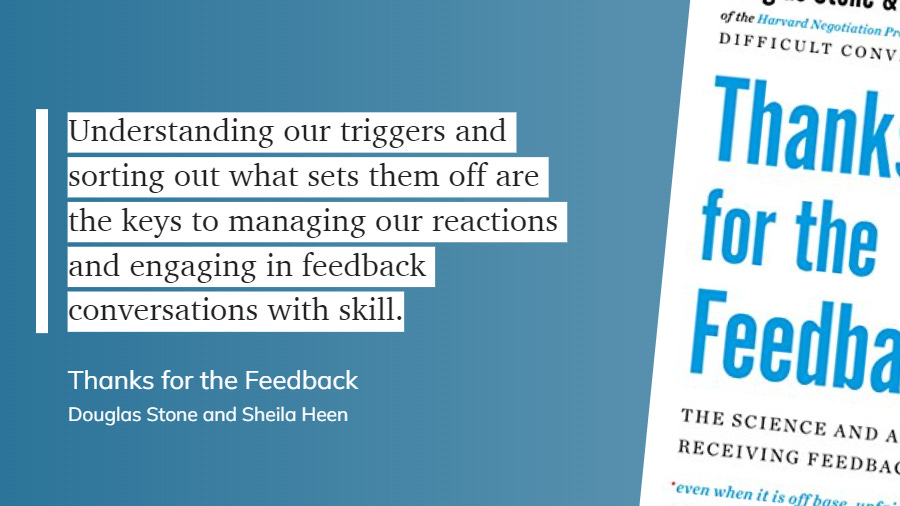Did you get any feedback today? I bet you did, even if it wasn't the "can we talk?" variety. What about during the week?
Here's some of what I’ve collected:
At the park today someone in the distance yelled "OI! Pick up your dog's crap!" at me. 😯 I was pretty taken aback and immediately felt like I was being accused of being an irresponsible dog owner. As someone who is meticulous about picking up after my dogs, I did NOT need to receive that instruction, but it was feedback that something wasn’t right - at least in that person’s world.
In a work-related WhatsApp chat group, someone left the group without warning, ostensibly (but as yet unconfirmed) in response to a comment I made. Instant feedback. Something in my comment triggered their response. Or did it? 😶 Incomplete feedback! I'll admit this was a bit distressing, and became a bit of a runaway piece of feedback in my head... was it something I said? What did they now think of me? If I contact them will I make it worse? What do other members of the group now think of me? What's going on for that person that they felt that was the best course of action? 🤷🏼♀️
Someone I gave a 1:1 session to last month posted a lovely unsolicited comment 👇🏼 on this LinkedIn post.
This was by far my favourite feedback experience, and led to me asking them for a testimonial, which was duly provided and frankly blew me away. I thought I had a reasonable handle on the situation, but it wasn’t until I actually asked, that I became aware of exactly how valuable my work had been for them.
A message from the bank saying that there weren't enough funds in one account to make a payment to another. Momentary stress 😬, but very clear and unambiguous feedback! Generated a few unpleasant thoughts.
And the list goes on. Feedback is everywhere.
You can't behave your way out of ever receiving feedback. You can't outrun it, and you will collapse trying.1
In each of these situations, my response (or lack of) to the feedback on offer was directly related to whether or not I thought the information was accurate, the extent to which I knew the sender, and (the tough part) what I thought it was telling me about myself.
Trigger happy
Whatever format feedback takes there are three types of triggers2 that can stop valuable information getting through to us:
Truth triggers - these are set off if the feedback feels unhelpful or untrue. We push what’s being communicated aside because, well, obviously that person is wrong! 😛
Relationship triggers - these relate to what we believe to be true about someone (what would they know?!), or how we feel treated by them in the process (how could you do that to me?). They lead us down the path of focusing on the giver and what their deficiencies are instead of the more uncomfortable work of focusing on ourselves.
Identity triggers - this is a biggie and these triggers can be deeply, intergenerationally baked. It’s literally all about us. If anything in any piece of feedback threatens our sense of self, we can quickly find ourselves acting through emotions like overwhelmed, embarrassed, defensive, or sometimes not even being able to recognise what’s come over us. This is perhaps the most destabilising trigger and it can be hard to know how to respond once this one is in play.
Given that feedback can - and does - come at us from all angles, at any time of the day from seemingly anyone, and given how much stress and discomfort it can generate, why don’t we spend more time improving our receiving game instead of our sending game?
One theory I have is that there simply aren’t affordable, easy to access learning opportunities available. So I’m fixing that right now.
I’m so convinced of the value in mastering this skill that I’ve developed a specialist workshop to help you do just that – Feedback without Fear. It’s available in person, online, and (in the future!) as a self-paced course.
Tell your friends or anyone you think could be a little bit better at receiving feedback. If you’re a people leader who’d like your team to get better at receiving feedback, make sure you line up first. 😉
Here’s to taming our triggers, together 🧠🧘🏼♀️
Kathryn
Douglas Stone and Sheila Heen - Thanks for the Feedback (2014)
as above 👆🏼







“ If anything in any piece of feedback threatens our sense of self, we can quickly find ourselves acting through emotions like overwhelmed, embarrassed, defensive, or sometimes not even being able to recognise what’s come over us.” —This one helped me see that the sharp, brutal feedback I received from someone this week spoke more about them feeling (consciously or not) their sense of identity threatened, than to anything I had done wrong. Thank you for the insights!